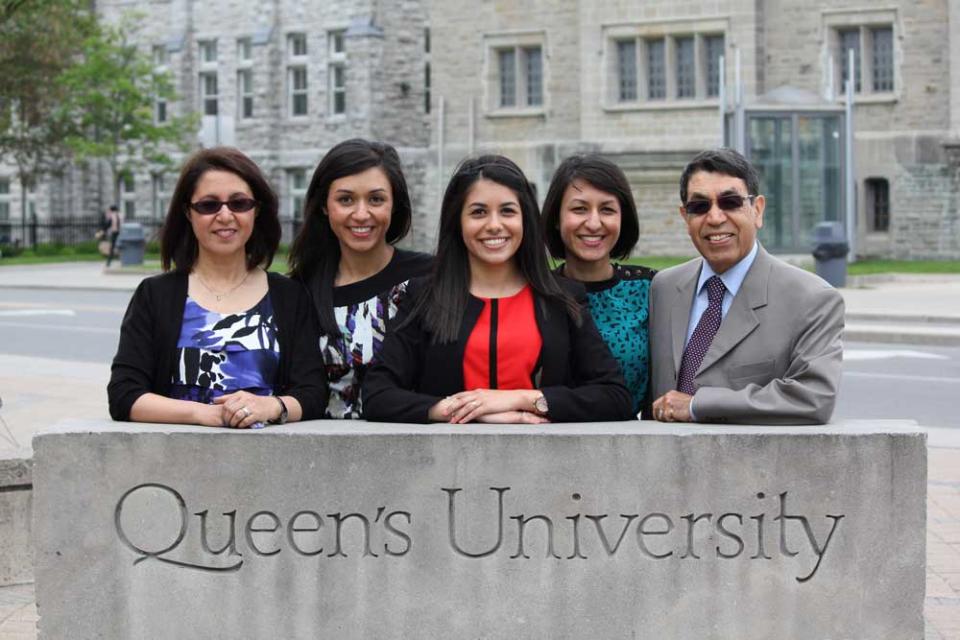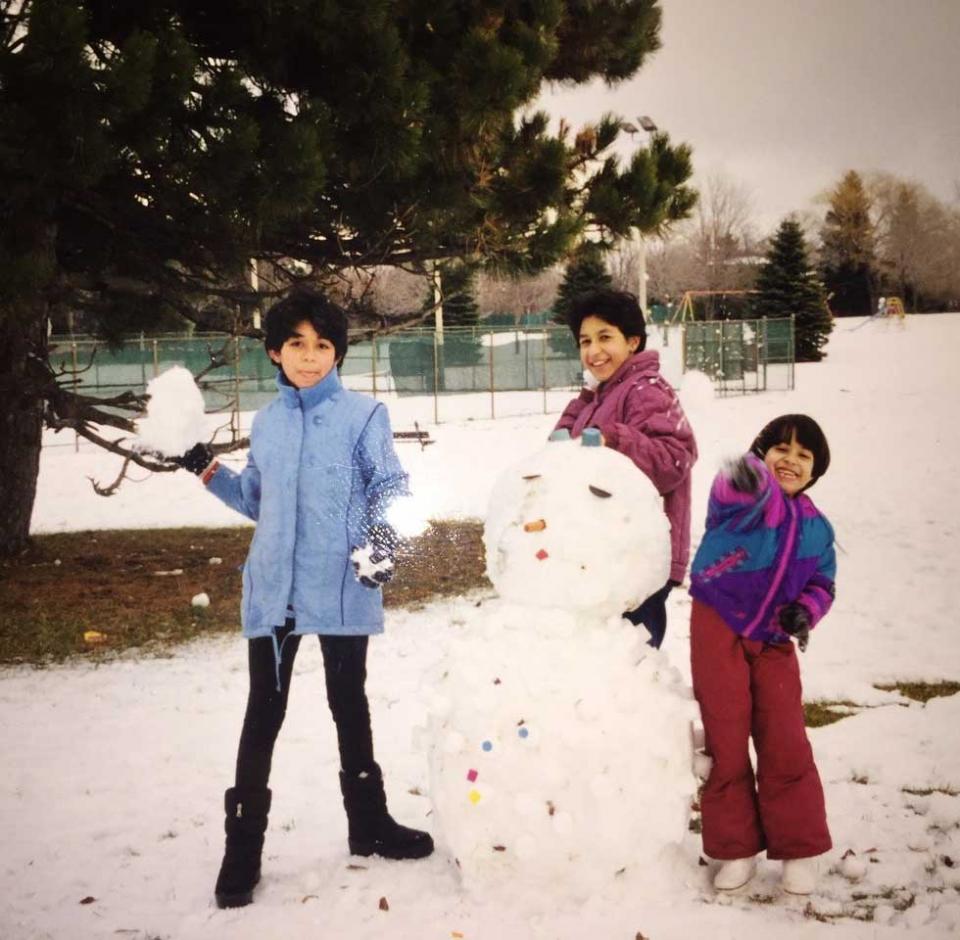Flight to Freedom
Childhood in Afghanistan

Commerce Convocation 2013: from left, proud mother Abeda; sisters Humaira, new graduate Trina and Mariam; with beaming father, Jelani Ghiacy.
“We used to play outside in our yard a lot,” recalls Humaira of life in Kabul during the civil war. “After a rocket landed in our backyard our parents risked everything to get us all out of Afghanistan.”
Hidden in the back of a transport truck, the family slipped out of Kabul in the fall of 1992. Only close family members were told of the planned escape, in order to lessen the risk of capture by the authorities. “We spent all day on bumpy, unpaved roads just to reach the Pakistan border,” says Mariam. “As we got closer to the checkpoint, we were told not to make a sound. We made it through then slept in the truck overnight before reaching Peshawar later the next day,” adds Humaira.
Refugees in Pakistan
After a few months in Peshawar, the family moved to Islamabad, where Jelani found an engineering job at a construction company and Abeda worked for a non-profit organization. The elder girls went to school and all three sisters soon learned to speak Urdu, though Farsi remained the language spoken at home.
“Having to learn a new language and adapting to a different way of life was a culture shock,” recalls Humaira. Also traumatic was the loss of contact with the extended family they left behind. “There was no telephone service because of the war and our only news came from relatives who managed to visit us from time to time.”
After two years in Islamabad, Jelani and Abeda realized that a return to Afghanistan would not be possible and that their daughters’ futures would be limited if the family decided to stay in Pakistan. While not as restrictive as Afghanistan, the educational system there offered limited opportunities for girls. In researching different countries they discovered that Canada welcomed immigrants with professional backgrounds. Three years after starting the gruelling application process, the Ghiacys were granted landed-immigrant status. They arrived in Toronto in the winter of 1997, ready to start from scratch once more.
Home at last, in Canada
“I love Toronto now,” says Trina, who works downtown as a senior analyst at TD Commercial Banking. “But when we first got here, I hated it, mostly because I didn’t speak any English and I found Toronto pretty overwhelming.” Her parents, who felt the same way, asked a Canadian friend to recommend a smaller city with good schools. Coincidently, that friend was from the Kingston area and knew of a house for rent there. The community seemed to check all the boxes, so Jelani and Abeda arranged to rent the house, sight unseen. With the friend’s help, the family moved there in March of 1998.
The house actually was on Wolfe Island, just a short ferry ride away from Kingston’s downtown. Normally a picturesque and tranquil locale, it had been devastated by the ice storm
that had crippled large swaths of Ontario and Quebec earlier that year.

Their first Canadian winter: Humaira, Mariam, Trina and friend in Toronto.
The entire family went to school, the parents to learn English and the girls to elementary and middle schools. “We entered the regular school system without any language training,” says Mariam. “People were very nice and welcoming, but we couldn’t communicate with them, so it was very difficult at first.” Her solution was to visit the library and read children’s picture books to learn English. All three girls eventually mastered the language and excelled in school, both in the classroom and in extracurricular activities. Their parents were less successful in finding jobs in their respective fields. Jelani started volunteering at the Ministry of Transportation and the United Nations Development Program, eventually landing contract positions. In 2003, he accepted a civilian position with the Canadian military, working in his field to help rebuild Afghanistan, which had been damaged by years of war. Abeda took courses at Queen’s and St. Lawrence College and eventually landed a position at a telecommunications company.
A Milestone Year
All five members of the Ghiacy family were sworn in as Canadian citizens on Canada Day in 2001. “Because we were young, we didn’t have to take the citizenship test, but our parents did,” says Humaira. “By then, our English was better than theirs, so we helped them and ended up learning a lot. It’s a difficult test that I think native-born Canadians would also find challenging.”
Two months later, on Sept. 11, Humaira was in her Grade 9 French class when two planes flew into the Twin Towers in New York. “I already felt Canadian by then, but when 9/11 happened, some of my classmates asked if I was ok, because they were concerned that I would be more shaken by the event because of my background. We are fortunate to be in Canada, where people are so tolerant and respectful of each other.”
Opportunities seized
Given all that their parents had sacrificed to bring them to Canada, the Ghiacy sisters took full advantage of all the educational opportunities at hand. All three set their sights on Queen’s, eventually applying to the Commerce program, with Mariam leading the way. “I knew when I was in high school that getting into Queen’s would require good marks and strong extracurricular and leadership experience.” She set about achieving both, receiving the Millennium Excellence Award and entering into Queen’s Commerce in 2003. Impressed by Mariam’s experience, Humaira followed suit two years later. Trina started first year the autumn following Humaira’s graduation, after receiving a prestigious Chancellor’s Scholarship, one of only 50 awarded to exceptional students across Canada each year.
“Queen’s Commerce has among the highest entry standards of any undergraduate business program in the country,” says Lori Garnier, Executive Director of the Commerce Program. “That three siblings were not only accepted, but excelled, is evidence of the perseverance the entire family has demonstrated throughout their journey.”
Today the Ghiacys remain a very close-knit family. After graduation, Mariam settled in Toronto, working in the financial industry, where she was later joined by Trina. Meanwhile, Humaira had moved west to become an HR account manager at Shell in Calgary, to which Mariam re-located in 2015, where she now works as a strategy advisor in operational excellence at Enbridge. All three sisters keep in close touch with their parents, who continue to live in Kingston. The family often travels together, especially when Jelani is competing in NATO chess tournaments through his role as the past president of the Canadian Armed Forces’ Kandahar Chess Club.
“In our travels, we’ve seen the way many different societies operate,” says Mariam. “We feel so proud to be Canadian, to share our values of helping each other, of being supportive and open to all kinds of faiths and cultures. The mosaic that we have here in Canada is unique, and we feel fortunate to be members of it.”
